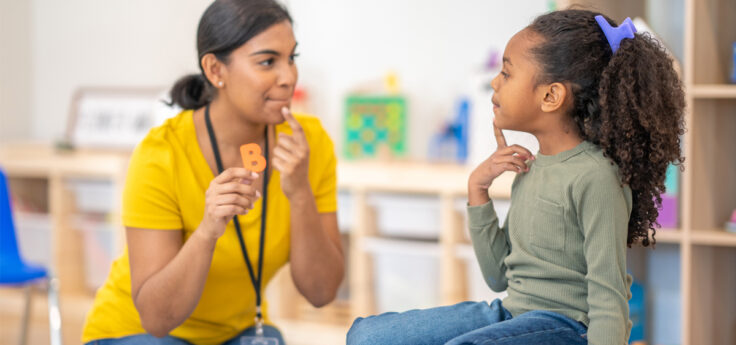Speech-Language Pathology
Supporting the professional development of speech-language pathologists.

-
Consultations
Speech-Language Pathology: Consultation
Our specialists consult with your campus, district, or charter to provide help and support for your speech-language pathologists.
View Consultations Details: Speech-Language Pathology: Consultation -
Professional Development
Speech-Language Pathology: Custom PD
We provide customized training for campuses, districts, and charters to support your speech-language pathology programs. Districts and charters can request individualize professional development to address the topics of greatest need for their educational team.
View Professional Development Details: Speech-Language Pathology: Custom PD -
![]()
Series
Speech Webinar– Cracking the Behavior Code: Strategies for Success
Webinar 7 of 10, this session will have an SLP and a BCBA team up to break down the essentials of behavior science in a way that makes sense for speech therapy.
View Series Details: Speech Webinar– Cracking the Behavior Code: Strategies for Success -
![]()
Series
Speech Webinar– Fun & Engaging Therapy Ideas Through Purposeful Play & Breaking Up is Hard to Do: Dismissal from Speech-Language Therapy
Webinar 8 of 10, this session will explore creative, play-based approaches to speech therapy that promote communication, participation, and progress for a variety of age ranges.
View Series Details: Speech Webinar– Fun & Engaging Therapy Ideas Through Purposeful Play & Breaking Up is Hard to Do: Dismissal from Speech-Language Therapy -
![]()
Series
Speech Webinar– The Autistic Brain: Better Understanding = Better Outcomes
Webinar 9 of 10, this session will look at the latest brain research in autism to help SLPs recommend interventions and supports for better outcomes.
View Series Details: Speech Webinar– The Autistic Brain: Better Understanding = Better Outcomes -
![]()
Series
Speech Webinar– Contemporary Research, Lived Experiences & The Neurodiversity Paradigm
Webinar 10 of 10, this session examines what ethical, evidence-informed support for Autistic students can and should look like in public school settings.
View Series Details: Speech Webinar– Contemporary Research, Lived Experiences & The Neurodiversity Paradigm -
![]()
Conference
Para World: A SPED Paraeducator Conference 2026 (Austin)
Austin location: Gain practical strategies, fresh ideas, and meaningful connections through a conference designed just for you.
View Conference Details: Para World: A SPED Paraeducator Conference 2026 (Austin) -
![]()
Conference
Para World: A SPED Paraeducator Conference 2026 (La Grange)
La Grange location: Gain practical strategies, fresh ideas, and meaningful connections through a conference designed just for you.
View Conference Details: Para World: A SPED Paraeducator Conference 2026 (La Grange) -
![]()
Conference
Para World: A SPED Paraeducator Conference 2026 (Marble Falls)
Marble Falls location: Gain practical strategies, fresh ideas, and meaningful connections through a conference designed just for you.
View Conference Details: Para World: A SPED Paraeducator Conference 2026 (Marble Falls) -
![]()
Program Support
Speech-Language Pathology Master’s Degree Program Support
A master’s level speech-language pathology (SLPs) program for both in-field and out-of-field students. Successful program completion prepares graduates to apply for Texas licensure in speech pathology and American Speech-Language-Hearing Association (ASHA) certification.
View Program Support Details: Speech-Language Pathology Master’s Degree Program Support
Who are Speech-Language Pathologists?
Speech-Language Pathologists in public schools (SLPs) serve students with speech impairment (SI). IDEA 2004 defines Speech Impairment as “a communication disorder, such as stuttering, impaired articulation, a language impairment, or a voice impairment, that adversely affects a child’s educational performance” (C.F.R. §300.8.). Speech Impairment can result from the presence of other conditions including cerebral palsy, cleft palate, hearing loss, autism, learning disabilities, and traumatic brain injuries.
Speech-Language Pathologists in public schools serve students with speech impairments in a variety of ways including performing evaluations, developing Individualized Education Plans (IEPs), and providing intervention. Intervention services may be provided to students individually, in small groups, in the general education classroom, or via a consultation model. The type of intervention students receive is determined on an individual basis by each students' IEP Committee (also known in Texas as the ARD Committee). School-based SLPs also may provide prevention services, collaboration with other instructional personnel, and training or professional development.
We provide training and support with program evaluations and student-specific concerns related to Speech-Language Pathology.




